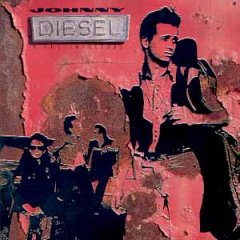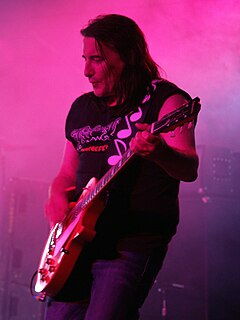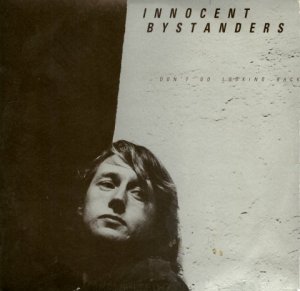Related Research Articles
Pub rock is a style of Australian rock and roll popular throughout the 1970s and 1980s, and that was still influencing contemporary Australian music in the 2000s decade. The term came from the venues where most of these bands originally played — inner-city and suburban pubs. These often noisy, hot, small and crowded venues were not always ideal as music venues and favoured loud, simple songs based on drums and electric guitar riffs.

Head Injuries is the second studio album by Australian pub rockers Midnight Oil, which was released in October 1979 on their own Powderworks label and distributed by Columbia Records. The album was produced by Leszek J. Karski, recorded at 'Trafalgar Studios' in Sydney. It was the last Midnight Oil album to feature founding bass guitarist Andrew James, who quit the band due to illness. It peaked at No. 36 on the Australian Kent Music Report and by mid-1980 had achieved gold status.

The Screaming Tribesmen were an Australian rock band formed in Brisbane, Queensland in 1981 by mainstay Mick Medew on lead vocals and lead guitar. With various line-ups they released three studio albums, Bones and Flowers, Blood Lust (1990) and Formaldehyde (1993), before disbanding in 1998. They reformed in 2011 for performances until June 2012. Australian musicologist, Ian McFarlane, described how they, "fashioned a memorable brand of 1960s-inspired pop rock that combined equal parts existential lyric angst, melodic inventiveness and strident guitar riffs."

Mark Denis Lizotte is an American-born Australian singer-songwriter and musician, who has released material under the name Diesel, Johnny Diesel, as leader of band Johnny Diesel & the Injectors, and as a solo performer, as well as under his birth name. Two of his albums reached No. 1 on the Australian Recording Industry Association (ARIA) Albums Charts, Hepfidelity in 1992 and The Lobbyist in 1993.

Johnny Diesel and The Injectors is the eponymous debut album by Australian rock band Johnny Diesel and the Injectors, originally released in 1989. The album peaked at number 2 in Australia and won two ARIA Music Awards.

Live in London is the first extended play by Australian hard rockers, Johnny Diesel and the Injectors. The four tracks were recorded live in May 1989 and released in July of that year via Chrysalis Records and EMI Music. The group were touring the United Kingdom in mid-1989 and broadcast a live performance, via BBC Radio 1, for the Tommy Vance Sessions, which was produced by Tony Wilson. The EP reached No. 27 on the ARIA Albums Chart. Three of the tracks appear on their previous studio album, Johnny Diesel and the Injectors,. While "Rat Pack" was a new track.

Soul Lost Companion is the sixth studio album by Australian rock singer-songwriter, Mark Lizotte, and issued under his birth name. Otherwise he generally uses his stage names, Diesel, Johnny Diesel or Johnny Diesel and the Injectors. It appeared in September 1999, which peaked at No. 18 on the ARIA Albums Chart. It provided two singles, "Dig" and "Satellite" (November). Lizotte toured Australia from August to December promoting the album, sharing stages with Taxiride.
Peter William "Pete" Wells was the founder and slide guitarist in Australian hard rock band, Rose Tattoo, from 1976 to 1983. He was previously bass guitarist with the pioneering heavy metal outfit Buffalo from 1971 to 1976. Wells also had a solo career and issued albums, Everything You Like Tries to Kill You (1991), The Meaning of Life (1992), No Hard Feelings (1993), Orphans (1994), Go Ahead, Call the Cops (1996), It's All Fun and Games 'till Somebody Gets Hurt (1999), Hateball (2000) and Solo (2002). In 2002 he was diagnosed with prostate cancer and, on 27 March 2006, Wells died of the disease, aged 59. Rose Tattoo were inducted into the Australian Recording Industry Association (ARIA) Hall of Fame on 16 August of that same year.
Blackfeather are an Australian rock group which formed in April 1970. The band has had numerous line-ups, mostly fronted by founding lead singer, Neale Johns. An early heavy rock version recorded their debut album, At the Mountains of Madness, which peaked at number seven on the Go-Set Top 20 Albums chart. It provided the single, "Seasons of Change", which was co-written by Johns with lead guitarist, John Robinson. In July 1972 a piano-based line-up led by Johns issued an Australian number-one single, "Boppin' the Blues".
Rob Bailey is an Australian musician who was an early bassist with the hard rock band AC/DC. He joined the group in April 1974, with Malcolm Young, Angus Young, Dave Evans and Peter Clack (drums). Bailey left in January 1975.

Simon John Binks is an Australian rock musician who was a guitarist and singer-songwriter for Australian Crawl from founding in 1978 to disbanding in 1986.

Michael Thomas Cocks was an Australian musician, most noted for his guitar and songwriting work with Rose Tattoo. His original sound and style heavily influenced Guns N' Roses, who recorded a cover of the Rose Tattoo song "Nice Boys". He was also a member of Heaven, The Headhunters, Illustrated Men, Doomfoxx, Pete Wells Heart Attack and the Ted Mulry Gang. On 16 August 2006, Rose Tattoo were inducted into the Australian Recording Industry Association (ARIA) Hall of Fame. In April 2009 Cocks was diagnosed with liver cancer and died from the disease on 22 December 2009. He was the fifth member of Rose Tattoo to die of cancer, he was predeceased by Dallas Royall (1991), Peter Wells (2006), Ian Rilen (2006), and Lobby Loyde (2007).

Don't Go Looking Back is the debut album by Australian rock band Innocent Bystanders, originally released in 1986. The album reached #59 on the Australian album charts in September 1986.

Xenophobia (Why?) is the third studio album by Australian rock band Spy vs. Spy, it was produced by Les Karski and Guy Gray, and released through WEA in March 1988. For this album Spy vs Spy were known as v. Spy v. Spy, and the line-up was the original trio Craig Bloxom on bass guitar/lead vocals, Cliff Grigg on drums/percussion and Mike Weiley on lead guitar/vocals.

A.O. Mod. TV. Vers. is the second studio album by Australian rock band Spy vs Spy, produced by Leszek Karski and released through WEA in December 1986.
John "Yak" Sherrit is an Australian drummer best known for his drumming on several studio albums of Johnny Diesel and the Injectors, and touring with Diesel, Jimmy Barnes, and Richard Clapton.

"Don't Need Love" is the debut single by Australian rock group Johnny Diesel and the Injectors. The song was released in October 1988 and peaked at 10 in Australia and 7 in New Zealand.

"Soul Revival" is a song by Australian rock group, Johnny Diesel and the Injectors. The song was released as the band's second single from their debut album Johnny Diesel and the Injectors in February 1989 and peaked at 9 in Australia. A limited edition picture disc was released in May.

"Cry in Shame" is a song by Australian rock group, Johnny Diesel and the Injectors. The song was released as the band's third single from their debut album Johnny Diesel and the Injectors in April 1989 and peaked at 10 in Australia, becoming the band's third top 10 single.
References
- 1 2 3 4 5 McFarlane, Ian (1999). "Encyclopedia entry for 'Johnny Diesel'". Encyclopedia of Australian Rock and Pop . St Leonards, NSW: Allen & Unwin. ISBN 1-86508-072-1. Archived from the original on 3 August 2004. Retrieved 4 December 2009.
- 1 2 Nimmervoll, Ed. "Diesel". Howlspace – The Living History of Our Music (Ed Nimmervoll). White Room Electronic Publishing Pty Ltd. Archived from the original on 26 July 2012. Retrieved 10 February 2014.
- 1 2 3 Spencer et al, (2007) INNOCENT BYSTANDERS [ permanent dead link ] entry. Retrieved 4 December 2009.
- 1 2 3 4 Magnus Holmgren (ed.). "Diesel". Australian Rock Database . Magnus Holmgren. Archived from the original on 29 September 2013. Retrieved 4 December 2009.
- ↑ "Diesel Interview – Focus Magazine". Archived from the original on 14 December 2007. Retrieved 3 January 2008.
- 1 2 3 Kent, David (1993). Australian Chart Book 1970–1992 . St Ives, N.S.W.: Australian Chart Book. ISBN 0-646-11917-6. NOTE: Used for Australian Singles and Albums charting from 1970 until ARIA created their own charts in mid-1988.
- ↑ Spencer et al, (2007) JOHNNY DIESEL AND THE INJECTORS Archived 16 December 2014 at the Wayback Machine entry. Retrieved 4 December 2009.
- 1 2 Kent, David (1993). Australian Chart Book 1970–1992 (illustrated ed.). St Ives, N.S.W.: Australian Chart Book. p. 148. ISBN 0-646-11917-6.